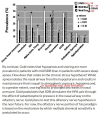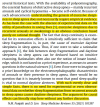I think most importantly a theory should be able to explain PEM one way or another. I don't really see how it does that?
Hi Jesse, I am going to come back to my post here sometime later this week and revise it so it provides a better overview of the theory, including how it may explain PEM, but for now...
In my OP I linked to a thread I made specifically on how I think UARS can explain PEM, and why I think PEM is best explained as a CNS problem & not a metabolic/mitochondrial/etc. problem. It cites
@ME/CFS Skeptic 's analysis of 2-day CPET data showing that 2-day CPET does not reliably distinguish between ME/CFS patients & controls (& that overall metabolic differences between the two seem modest). It also ties in Dr. Herbert Renz-Polster's detailed hypothesis/write-up about PEM resulting from impaired adaptation to/recovery from exertion due to a dysfunctional CNS stress response. I'll link it here again though (add "cancel" after the x in the URL to view it without an account):
Anyways, if people want, I'd be happy to just leave ME/CFS & PEM out of it since PEM is not an established symptom of UARS. We can just discuss the evidence re: fibromyalgia & Gulf War illness, for example.
Another thing that turns me off from this theory is that it's supposed to explain a whole host of very different diseases. People have been trying to blame stress for ME/CFS, FM, IBS, POTS, migraines, insomnia and many other diseases forever. And while the autonomic nervous system is cleary involved I highly doubt it's the main driver for any of those.
Sorry it turns you off the theory, that's not a good reason for rejecting the theory though. UARS/OSAS is theorized to be caused by a physiological stress response in the brain to inspiratory flow limitation during sleep (while people are unconscious!), it has nothing to do with daytime/psychological stress, though it can likely be triggered by psychological stress/trauma (along with any other stressor - please acknowledge the many, many ME/CFS patients out there who had clear non-infectious triggers to their illness), and it can likely cause/contribute to "psychiatric" symptoms like chronic insomnia/anxiety/depression/etc. (note I put psychiatric in quotes because I think these symptoms can be direct symptoms of UARS just like depression can be a symptom of hypothyroidism, MS, Parkinson's, etc.)
Finally I can imagine it's not nice to have many people criticize your theory. But please remember that people here are generally pretty smart and well researched and have read countless of theories just like yours that just don't seem to have a strong scientific basis. I also think everyone here has the shared goal of advancing ME/CFS research, and that requires us to be critical.
If we would consider the evidence for your theory strong enough, then it would be on equal footing with a hundred other theories. I don't think it would be in the interest of the field to throw money at all of those. Instead we should keep working on theories and ideas for which we have more evidence and a stronger model of how it relates to symptoms.
This is not
my theory, this is Dr. Gold's theory. He is the medical director at Stony Brook University Sleep Disorders Center, and he
has actually continued to publish research (whether or not sleep medicine finds it compelling does not make it bad research), he's just primarily a clinician, not a researcher.
https://www.researchgate.net/profile/Avram-Gold-2
His theory was published in Sleep Medicine Reviews in 2011 and sleep medicine largely ignored it/ridiculed it, again making arguments like the ones I have shared screenshots of above such as: "
As has been the case with the absence of experimental data on the utility of parachutes in saving lives, excessive sleepiness due to recurrent arousals/awakenings is an obvious conclusion based on purely rational thought...with such overtly clear and simple facts, there is no need for experimental or even observational data on whether sleep fragmentation from recurrent arousals in sleep apnea causes daytime sleepiness."
That is not how science works! lol


